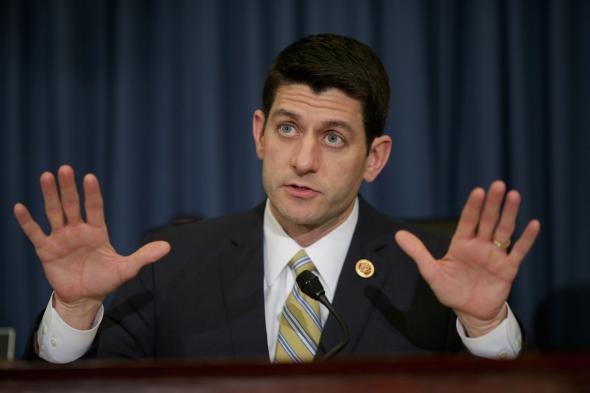On Tuesday, Rep. Paul Ryan took to the O’Reilly Factor to tell the world he isn’t a racist. “She does not believe that I have these views,” he said, referring to Rep. Barbara Lee of California, who had chastised his comments about “inner-city males” as a “thinly veiled racial attack.” Ryan continued: “She knows me well, and she knows that I don’t have a racist bone in my body.”
The question is: Does anyone have a racist bone in his body? Ryan’s bony response has become the de rigueur reply for anyone on the racial hot seat. A few favorites.
Who lacks a racist bone? Republican Sen. Bob Dole. According to a New York Times report, the kickoff to Dole’s 1988 presidential campaign was met with protests over his opposition to the African National Congress and support for the apartheid regime in South Africa. The protesters stood at the “fringe” of the rally supporting Dole, but they were irritating enough for him to interrupt his speech and address them. “The signs are wrong,” he said. “There isn’t a racist bone in my body.”
Who lacks a racist bone? Anti-immigration activist Harold Ezell. In 1994, Ezell was one of the architects of California’s Proposition 187, which blocked unauthorized immigrants from using state social services such as health care and public education. His opponents accused him of anti-Latino racism, and at one town hall in support of the proposition, he faced hundreds of Latino demonstrators: “Ezell cried foul, telling reporters on his way out that the assertion was ridiculous. ‘I don’t have a racist bone in my body,’ he said.”
Who lacks a racist bone? Shock jock Adam Carolla. This 2006 incident is described in a Los Angeles Times report on a debate between Carolla—then a replacement for Howard Stern after the latter leaped to satellite radio—and Guy Aoki, head of the Media Action Network for Asian Americans:
Aoki has said that Carolla continually used the words “Chinaman” and “gook” at KLSX and his previous “Loveline” show on KROQ-FM (106.7), but he said he and several other Asian American groups were especially outraged when a routine last January mocking the Asian Excellence Awards contained recordings of people saying “ching chong.” Aoki said the term was equivalent to the “N-word,” which he said Carolla would never use on air.
Carolla responded to the charges with a call for Aoki to “lighten up,” telling the activist, “There is not a racist bone in my body.”
Who has no racist bones? TV personality Jesse James. In 2010, James was estranged from his then-wife Sandra Bullock and in rehab when Us Weekly published a photograph of him in a German S.S. officer’s hat, giving a Nazi salute. James’ response was typical: “I don’t even remember taking the photo. I could tell by the look on my face it was a joke that was funny then, probably for a minute, but then looking at it in the context of now and in my life, it’s not funny,” he said in an interview on ABC’s Good Morning America.
“There’s not a racist bone in my body.”
Whose bones are unracist? Minnesota state Rep. Pat Garofalo. As far as politics is concerned, Garofalo is practically anonymous, but he gained national notoriety in 2014 after tweeting—in a “how could anyone possibly disagree with me?” way—that “70% of teams in NBA could fold tomorrow + nobody would notice a difference w/ possible exception of increase in streetcrime.” The problem is that the NBA is mostly African-American, which makes this incredibly racist, given stereotypes about black criminality.
His response? “I sincerely apologize to those who I unfairly categorized,” said Garofalo. “I don’t have a racist bone in my body. I pride myself on the fact I’ve tutored in inner-city Minneapolis.”
There are many, many more where this came from. The problem is that “I don’t have a racist bone in my body” only makes sense if your definition of racism stops at personal animus. If that’s true, then yes, I’m sure that most people lack racist bones.
But let’s broaden our horizons a bit. If we think of “racism” as material harm—or anything that furthers racial stereotypes—then it doesn’t require anyone to hold hatred or show explicit bias. Bob Dole’s support for the South African regime wasn’t racist because he hated black people; it was racist because it bolstered a racist government. Likewise, if Paul Ryan committed a racial offense, it was to perpetuate ugly ideas about low-income black men.
In other words, the only reason to say “I don’t have a racist bone in my body” is to change the subject: from what someone said or did to who he is. Indeed, when it comes to race, it’s much easier for people to talk about their boundless tolerance than it is to own up to their actions.
